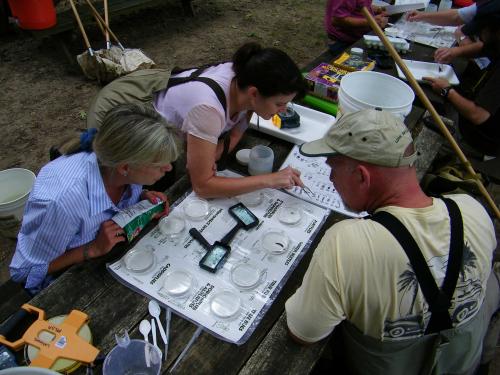Michigan Lake and Stream Leaders Institute builds local stewardship statewide
Applications due March 30 for the 2013 Michigan Lake and Stream Leaders Institute.
People are the key to protecting Michigan’s lakes and streams. People who are ready to step up in their communities and within their organizations as volunteers, community leaders, professionals, or who are just interested in protecting their lake or stream can make a difference. If this sounds like you, consider applying for the 2013 Michigan Lake and Stream Leaders Institute..
To be effective, aspiring lake and stream leaders need to be familiar with current aquatic science and management options and have the leadership skills necessary to work through sometimes challenging issues with a variety of interested stakeholder groups.
That is the idea behind Michigan’s Lake and Stream Leaders Institute. Since 2002, the institute has developed local water resource leaders who promote lake, stream and watershed management through partnerships between local communities and natural resource agencies, and encourage their neighbors and colleagues to take part in good resource management. Participants learn about the ecology of lakes and streams, develop strong leadership skills and gain an understanding of the institutions and legal frameworks that guide lake and stream protection and management in Michigan.
The institute itself is a partnership program developed and run by Michigan State University Extension, Michigan Lake and Stream Associations and the MSU Department of Fisheries and Wildlife with financial support from the Paul H. Young Chapter of Trout Unlimited.
Past participants have included natural resource agency staff, lake association and non-profit organization leaders, drain commissioners, educators and interested citizens. Today, nearly 100 institute alumni across Michigan are leaders of lake associations, work within state and local natural resource agencies, serve on planning commissions and monitor stream and lake quality.
The institute employs a combination of classroom activities, field experiences and independent work. Instructors are leaders and experts in their fields including university faculty, Extension educators, state and local agency professionals, leaders from non-profit organizations and institute alumni. Participants attend institute sessions, complete homework assignments and conduct an applied project which is shared with their peers and institute alumni during a poster symposium on graduation day. After graduation, participants can become engaged in an institute alumni program that promotes communication, continued learning possibilities and opportunities for service.
The 2013 Institute will meet face-to-face three times: May 17-18 at the Michigan DNR’s Ralph A. MacMullan Conference Center on Higgins Lake, July 26-27 at Kellogg Biological Station near Kalamazoo, and Oct. 11 at Potter Park Zoo in Lansing. Tuition for the 2013 institute is $375 and includes all instruction, materials, meals and overnight lodging at the RAM Center and KBS. Limited scholarships may be available.
Further information, application forms, and a preliminary agenda are now available. The application deadline for the 2013 Institute is March 30, 2013.



 Print
Print Email
Email






